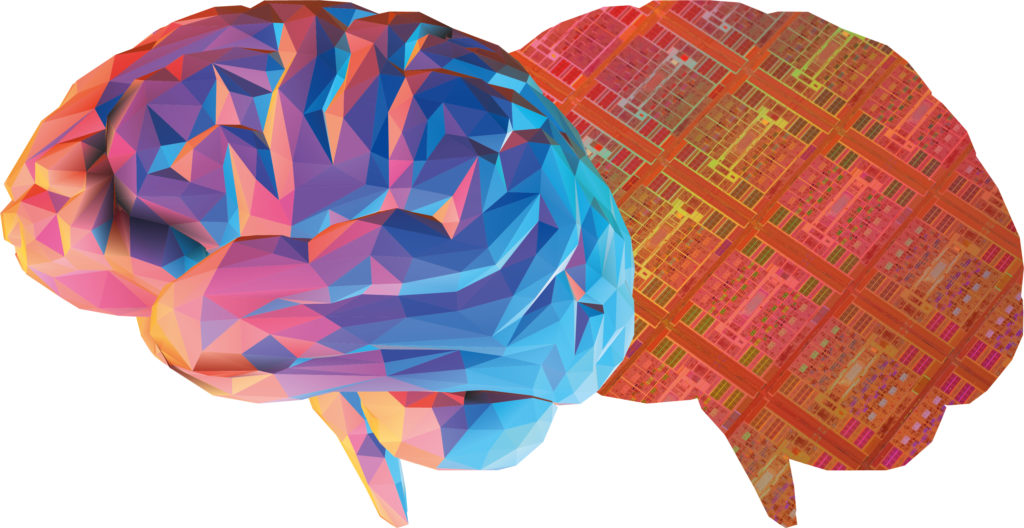NeuroSys succeeds in the first “Clusters4Future” ideas competition
The cluster “NeuroSys – Neuromorphic Hardware for Autonomous Artificial Intelligence Systems” will receive €45 million funding from the Federal Ministry of Education and Research to contribute to the technological independence of Germany and Europe in the field of artificial intelligence.

The Federal Ministry of Education and Research (BMBF) has announced the winners of the first call of the “Clusters4Future” initiative. Among the seven funded clusters there is “NeuroSys – Neuromorphic Hardware for Autonomous Artificial Intelligence Systems”, a consortium coordinated by Prof. Max Lemme, Scientific Director of AMO GmbH and head of the Chair of Electronic Devices at RWTH Aachen University. The goal of NeuroSys is to transform the excellent fundamental research done in Aachen and at Research Center Jülich on neuromorphic devices and algorithms into a viable technology-basis for future European AI-hardware. The vision is the technological independence of Europe in this ethically and economically sensitive area.
The “Clusters4Future” initiative is part of the High-Tech Strategy 2025 of the German government. This open-topic competition targets regional innovation networks that tackle societal challenges by tapping into emerging fields of innovation and by combining the strengths of different actors – from science and academia, industry and society. Conform to this scheme, NeuroSys brings together RWTH Aachen University, the Research Center Jülich, AMO GmbH, the Chamber of Commerce and Industry (IHK)Aachen, and the companies AixACCT Systems GmbH, AIXTRON SE, AppTek GmbH, ELMOS Semiconductor SE, RWTH Innovation GmbH and STAR Healthcare, together with the start-ups AiXscale Photonics UG, Black Semiconductor GmbH, Clinomic GmbH and Gremse-IT GmbH are involved. Each Future Cluster is funded by BMBF with up to €5 million per year for nine years.
Artificial intelligence: a key technology for the future
At the algorithm level, artificial intelligence (AI) is already dominating areas such as computer vision and language processing, and its role in our everyday life is only going to increase in the future. Technological independence in this field is of strategic importance, as AI will be the building block for the next global stage of development – not only in terms of economic growth, but also for addressing major societal challenges such as climate change, health, work or mobility.
The rise of AI poses new opportunities and new challenges, both from the societal and the technological point of view. For example, training large neuronal networks based on modern graphics processing units (GPUs) with deep-learning methods has a very heavy CO2footprint, which makes GPU-based neural networks ecologically unsustainable. Furthermore, it is already clear that traditional computer hardware is hitting its inherent limits when it comes to applications such as autonomous driving, personalized healthcare, smart cities, and Industry 4.0, which require innovative hardware concepts with high energy efficiency and data security. These open technological challenges represent an opportunity for Germany and Europe to gain positions in the world competition by developing and deploying its own AI hardware.
The potential of neuromorphic hardware
Resource-saving neuromorphic hardware that allows implementing neural networks more efficiently and that includes data security as a design component is becoming the key to the widespread use of AI. This is especially true for application areas in autonomous vehicles, medical technology, and the Internet of Things. Neuromorphic systems are modeled on the two basic building blocks of the brain: neurons and synapses. By integrating new materials with specific properties, they can ideally perform on-site processing of data in a way that saves resources.
Scientists at RWTH and Research Center Jülich have already been able to demonstrate the functionality of neuromorphic devices made of memristive materials, i.e. innovative materials whose electrical resistance can be externally programmed and re-set. However, there are no pilot lines or production capacities worldwide for manufacturing or integrating neuromorphic chips on an industrial scale. Also, the entire ecosystem of hardware, design, algorithms and application-driven software must work together to exploit the major benefits of neuromorphic hardware. Moving from excellent fundamental research to a viable technology requires a whole paradigm shift, and the goal of NeuroSys is to be the drive for this shift.
A great opportunity
The focus of NeuroSys is not only on the technological aspects of neuromorphic hardware, but also on the related ethical and socio-economical questions. Models and concepts for measuring the economic, social and normative sustainability of the innovations pursued by NeuroSys will be developed during the project, to ensure its long-term economic success and benefits for the society at large.
“The Future Cluster is a great opportunity for the Aachen-Jülich region, especially in connection with the structural change in the Rheinish mining area. It catalyses the transfer of excellent science into companies and start-ups in the region. Our vision is to set up a production line for memristive devices in the Aachen region, where the co-integration of neuromorphic functions through new materials into conventional silicon technology will then take place,” says Prof. Lemme. “To reach this goal we need to develop a whole ecosystem, from material science to dedicated software, that demonstrates the power of the new technology to attract the major investments needed for a fab. And we have to address crucial ethical and socio-economical questions related to AI, because what we are striving for is an AI conform to European values, where data protection and cyber security are ensured by design.”
Contact:
Univ. Prof. Dr.-Ing. Max Lemme
Chair of Electronic Devices
E-mail: max.lemme@eld.rwth-aachen.de
Phone: 0241/80-20280
